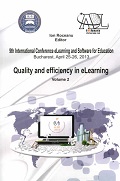PREDICTING THE STATE OF SECURITY USING NEURAL NETWORKS
PREDICTING THE STATE OF SECURITY USING NEURAL NETWORKS
Author(s): Marinel-Adi MUSTATA, Răzvan Grigoraş, Cristian TeodorescuSubject(s): Education
Published by: Carol I National Defence University Publishing House
Keywords: prediction; forecasting; neural networks; security
Summary/Abstract: This article proposes the use of neural networks as a solution with encouraging results in making predictions in the fields of security and international relations. It tries to bind the Copenhagen Security Model with neural networks, thus creating a holist course consisting of variables united by a fitting tool problem. These elements could indicate us through a scientific approach if the insecurity is inherent. The paper mainly refers to Tangredi, Kahn and Schwartz analysis in this field. One uses some datasets which are widely spread in the academic community (Correlates of war and Polity 4) in order to test the model. The results obtained from Eugene and Matlab Neural Network Toolbox are compared with the results of H. Kahn and B. Russet. Of course, it is shown that flexibility of the neural network models is able to reach important empirical relations drawn between democracy and conflict which aren't seen with other means. Finally, the paper tries to emphasize the importance of the scenarios and neural networks in security. One chooses to agree with supporting the neural networking because their usage opens a new age in the field of predictions. One demonstrates that this fact is happening because the neural model offers us the possibility of learning. It means that as long as the model roles it will correct its errors and become more accurate. It represents a valuable option for future studies which changes the meaning of the scenario from the tool used for developing simple tales of possible futures to description with "full ramifications" which are designed to change and modify our leaders' view of reality.
Journal: Conference proceedings of »eLearning and Software for Education« (eLSE)
- Issue Year: 9/2013
- Issue No: 02
- Page Range: 362-367
- Page Count: 6
- Language: English

